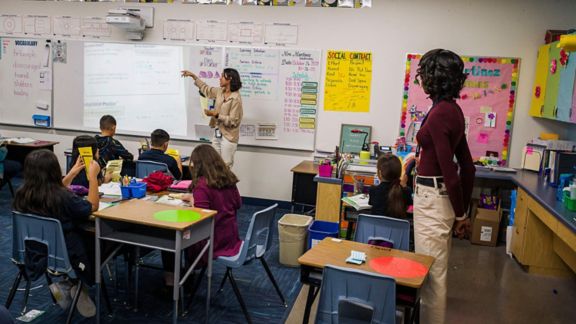A Surprising Number of Academic Leaders Support Psychedelic Therapy

This article is from our NORC Now newsletter. Subscribe today.
April 2025
A pioneering new survey from NORC and BrainFutures reveals a paradigm shift.
A vast majority of academics view psychedelic therapy positively, according to a groundbreaking NORC-BrainFutures survey of academic leaders from nursing, counseling and social work, psychology, and other disciplines. More than three-quarters of respondents (79 percent) believe psychedelics can potentially treat psychiatric disorders, and about two in five (42 percent) want their institution to add psychedelic therapy to the curricula.
These findings come amid an unprecedented U.S. mental health crisis. The Centers for Disease Control and Prevention reports that one in five Americans exhibited symptoms of anxiety and depression in 2023.
“We found a growing openness to the idea of psychedelic therapy among academics, coupled with a surprising lack of concern about potential career repercussions (e.g., keeping a job, finding a job, career growth, reputation) for expressing a professional interest in this once-taboo approach,” said Richard Smith II, a NORC research scientist and the study’s principal investigator. “These are both indicators that the stigma surrounding psychedelics is decreasing.”
Sarah Norman, executive director of BrainFutures added, “This survey captured considerable optimism among clinicians around the therapeutic potential of psychedelics, but there remain knowledge and training gaps in the academic institutions preparing future health care providers. As research on psychedelic interventions progresses, it’s critical to develop evidence-based training curricula and ensure clinicians are prepared to safely provide psychedelic-assisted therapies.”
Ours is the first comprehensive survey of academic leaders on the topic of psychedelics.
NORC partnered with BrainFutures, a nonprofit that advocates for evidence-based practices in mental health, to develop the first comprehensive survey of academic leaders from seven disciplines. We generated a custom sample of 4,908 academic leaders from 1,894 academic institutions.
First, we conducted stakeholder interviews with a select number of leaders and then transformed our findings into a nationwide survey that explored the following:
- The current levels of implementation and interest in psychedelic therapy-related curricula
- The demand for psychedelic-related open-source curricula
- Key factors influencing implementation across various programs
- Individual psychedelic therapy knowledge, attitudes, and experiences
After data cleaning, we included 363 complete responses from just three practice areas—nursing, psychology, and counseling/social work—in the primary analyses.
“While prior research focused on specific disciplines or professional groups, our research looked at the broader picture—how academic programs and administrators are thinking about and approaching the inclusion of a psychedelic therapy modality,” said Smith.
“Combining our ability to identify and gather scientifically rigorous data on academic leaders with the subject matter expertise of BrainFutures was an easy decision, so to speak,” said Erin Knepler, a senior research director with NORC’s Higher Education Analytics Center and our Education & Child Development department. “It’s this synergy that made our study unusual and successful.”
Enthusiasm for adding psychedelic curricula is high, but significant obstacles remain.
Our study found abundant interest in psychedelic therapy:
- A vast majority of respondents (83 percent) say there should be additional research into psychedelics as potential psychiatric treatments.
- Sixty percent of academics whose institutions already have a psychedelic therapy curriculum wish to expand it.
- Forty-two percent of those who don’t have psychedelic therapy-related education wish to add it.
- Seventy-one percent said their programs could offer funding for faculty training opportunities in psychedelics.
“It’s important to note that our survey was self-selecting, meaning that our respondents may have been predisposed to supporting psychedelic therapy,” said Smith. “That said, the results still highlight a much greater openness to psychedelics among a broader swath of academia.”
However, there are still substantial challenges to incorporating psychedelic medicine education:
- An overwhelming 92 percent of respondents report that their institution lacks qualified faculty to teach advanced coursework in psychedelic-assisted therapy.
- Only 3 percent of programs have psychedelic therapy-specific program tracks, none of which offered psychedelic therapy certificates.
- Fewer than one in four programs seek to add psychedelic therapy content to continuing education programs.
Our research also revealed that various academic disciplines are approaching the integration of psychedelic therapy differently. For example, while almost 41 percent of counseling/social work respondents strongly believed that Indigenous psychedelic practitioners should be involved in the development and implementation of psychedelic therapy-related curricula, only 15 percent of psychology and about 21 percent of nursing respondents did.
Free resources and training are needed to move the field forward.
While our study underscores the increasing momentum toward embracing psychedelic therapy in academic settings, respondents say additional training and free resources are essential to further progress. In particular, a quarter of counseling and social work respondents expressed personal interest in learning more about psychedelic therapies, as did approximately half of psychology and nursing professionals.
“There are institutions that have the resources to add psychedelic-related education but are waiting for the opportune moment—such as the decriminalization of psychedelics—to incorporate it,” said Smith. “However, even they could benefit from open-source curricula and other free training materials and faculty development opportunities.”
BrainFutures is already employing our research to create such resources. Based on insights from a group of leaders in the field across nursing, social work, and psychiatry, BrainFutures released Integrating Psychedelic Coursework into Higher Education: A Toolkit for Academic Leaders and an accompanying list of established programs that faculty can contact for guidance. The organization has also profiled several of these leaders in a series of short interviews that offer real-world success stories.
Our findings will inform policies and programs to aid mental health.
Our insights will provide policymakers and academic stakeholders with the information they need to equip future providers with the knowledge and tools to put innovative psychedelic therapies into practice for the ultimate benefit of patients.
“When institutions and academic programs show significant interest in exploring psychedelic therapy, it strengthens the case for greater funding and research into that area,” said Smith. “In addition, our findings provide institutions and their administrators with a better understanding of what their particular university, program, and department might need to move these conversations and initiatives forward.”
This article is from our flagship newsletter, NORC Now. NORC Now keeps you informed of the full breadth of NORC’s work, the questions we help our clients answer, and the issues we help them address.









